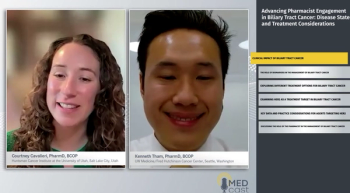Courtney Cavalieri, PharmD, BCOP
Articles by Courtney Cavalieri, PharmD, BCOP

Panelists discuss how pharmacists play a crucial role in biliary tract cancer management by leveraging their detailed medication knowledge to assist with treatment selection, develop comprehensive monitoring plans (especially for hyperphosphatemia with FGFR inhibitors and cardiac monitoring with HER2 therapies), educate patients about unique toxicities and self-management strategies, create clinic workflow algorithms for toxicity management, and advocate for maximizing time on therapy as long as patients maintain response or stable disease given the limited treatment options available for this rare cancer type.

Panelists discuss how trastuzumab deruxtecan demonstrated a 22% overall response rate in patients with biliary tract cancer (56.3% in HER2 3+ patients) with 7.4 months progression-free survival in the tumor-agnostic DESTINY-PanTumor02 trial, while zanidatamab showed a 52% confirmed response rate with 7.2 months progression-free survival in HER2 3+ patients in the biliary-specific HERIZON-BTC-01 trial, with treatment selection between these agents requiring individualized case-by-case decisions based on toxicity profiles, dosing schedules, and patient-specific factors since no head-to-head comparison data exist.

Panelists discuss how HER2-targeted agents in biliary tract cancers include trastuzumab deruxtecan (an antibody-drug conjugate that acts like a “smart missile” delivering cytotoxic payload to HER2-expressing cells with risks of pneumonitis and myelosuppression) and zanidatamab (a bispecific antibody targeting 2 different HER2 epitopes simultaneously for enhanced cytotoxicity with primarily antibody-related toxicities like cardiac effects and diarrhea but without chemotherapy-related adverse effects).

Panelists discuss how first-line treatment typically involves gemcitabine-based cytotoxic chemotherapy (particularly gemcitabine with cisplatin) that has evolved to include chemo-immunotherapy combinations with checkpoint inhibitors like durvalumab and pembrolizumab, while second-line options include FOLFOX and targeted therapies based on specific mutations, with detailed focus on FGFR2 inhibitors like pemigatinib and futibatinib, which show promising response rates (35%-42%) but require careful monitoring for unique adverse effects including hyperphosphatemia and dermatologic toxicities.

Panelists discuss how comprehensive next-generation sequencing is performed to identify key biomarkers including IDH1/2 mutations and FGFR2 fusions (predominantly in intrahepatic cholangiocarcinoma), HER2 amplifications (common in gallbladder cancers), and other actionable alterations like BRAF V600E mutations, with NCCN guidelines recommending testing for specific biomarkers to guide targeted therapy decisions and clinical trial enrollment given the rarity of biliary tract cancers and limited treatment options.

Panelists discuss how biliary tract cancers represent a rare but serious disease state with approximately 41,000 new cases annually in the US, associated with inflammatory conditions like gallstones and primary sclerosing cholangitis, presenting with nonspecific symptoms except for jaundice in extrahepatic cases, and carrying a poor prognosis with only 10% to 20% 5-year overall survival rates across all stages.

Courtney Cavalieri, PharmD, BCOP; and Kenneth Tham, PharmD, BCOP, discuss how pharmacists play a crucial role in managing patients with biliary tract cancer by providing expertise on biomarker testing, treatment selection between targeted therapies like FGFR and HER2 inhibitors, developing monitoring protocols for unique toxicities such as hyperphosphatemia, and educating patients on adverse effect management to optimize treatment outcomes in this rare cancer type.



